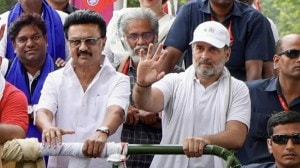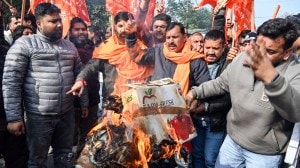Ten years ago in Berlin
The first man who breached the Berlin Wall was, in retrospect, the New Manwhom even Marx would not have recognised. This day ten years ag...

The first man who breached the Berlin Wall was, in retrospect, the New Manwhom even Marx would not have recognised. This day ten years ago, the daythe Wall fell to the passions of freedom, the first act of this century8217;sgreatest demolition was performed. After all, what was the Wall if not thevisible, concrete translation of the Iron Curtain? It was more than thesoaring monument of the Cold War. It was the thickest line between ideologyand the idea of freedom, socialist superstition and capitalist realism,between man and man. In 1989, Europe8217;s annus mirabilis, the breached Wall,Ossis-Wessis bhai bhai, was a dramatic rejoinder to the pretense ofcommunism. For, on the eastern side of the wall lay the artificialdemocratic republic where democracy was a synonym for the Leader8217;s choice.
On the other side lay Europe8217;s most powerful nation with an incurable guiltcomplex, the federal republic. Between them stood the Wall, separating thecaged from the free, the Wall as a bar- bed-wire guarantee against culturaland capitalist pollution. That day on November 9, when Ossis defied theconcrete, they were reaching out to the new world, they were falling, sowillfully and innocently, to the raw temptations of freedom. The bogeyman ofsocialist classrooms, the D-mark-wielding demon of the West, looked sodifferent that day. The liberated saw beyond the granite debris the firstimages of the brotherhood of redemption.
People, not the abstract masses of the communist narrative, made itpossible. They executed the will of history, and two men, the last communistof the Soviet empire and the last larger-than-life chancellor of Germany,turned the demise of the Wall into a new chapter of reconciliation. HelmutKohl, the chancellor who never missed the fine prints of history, was readyto sacrifice for the sake of re-unification. Mikhail Gorbachev, theMikhailangelo8217; who sculpted the empire to a humane form, didn8217;t send tanksto preserve the satellite. True, the post-Wall scenario witnessed the makingof a third world within the first world, and the contrast was starker inre-unified Germany. But Kohl was willing to bankroll the historicalcorrection. And his triumph was truly historic.
Still, for a while, it seemed deceptive as the remains of the Wall tookrefuge in souvenir stalls. One legitimate question was: Has the wallmigrated to the mind? As the neo-Nazi theme song merged with the wail of theTurkish victim, as the politics of hate aggravated the social divisions ofre-unification, it was a legitimate liberal question. But there is no easytransition, and the tamed German eagle was not destined to be the guardianof domestic calm. Today, despite the initial dissonance, despite GunterGrass the socialist8217; critic of re-unification, Germany is a nationwithout nostalgia. In the post-Wall Europe, this post-Kohl nation ofmiddle-path socialism is a testament of togetherness: what has started inBerlin should end up a pan-European story of living without frontiers. TheWall-less city of Berlin is today the capital of a nation which continues tocelebrate the idea of unification. Europe today is happy to live without awall to write the message of salvation.
- 01
- 02
- 03
- 04
- 05































